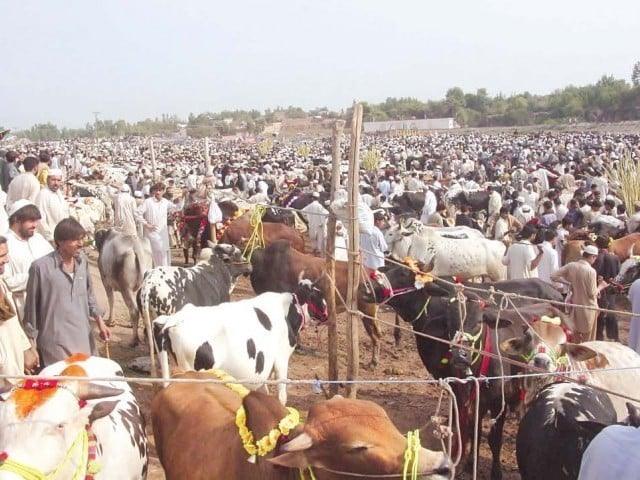Rawalpindi:
As the religious festival in Eidul Azha is approaching quickly, three major sacrificial animal markets have set up in the twin towns of Rawalpindi and Islamabad so far not failed to attract potential buyers due to skyrocketing prices.
With only four days left, until Eidul Azha, the three major livestock markets in Twin Cities-Bhata Ground (Cantonment), I-12 and Rawat-Kallar are filled with animals. However, buyers are few and far in between.
Sky -high prices of goats, sheep, cows, bulls and camels have left most people who can’t afford an animal of their choice. If this trend continues, dealers may again be forced to take unsold livestock at home, as it happened last Eid.
Many citizens who cannot afford individual animals have already begun to reach out to organizations that organize collective (common) victims.
Contracts for the three most important livestock markets were auctioned at high rates with Bhatata Ground Market on RS165.7 million, I-12 Market RS55m and Rawat-Kallar Syedan Market over the RS30m.
After these auctions, livestock was transported in trucks from Punjab and other provinces. Events including tents, lighting, drinking water, animal feed, safety, vehicle parking and livestock health inspections from veterinarians were made in these markets.
Despite these facilities, sales have been bleak.
A goat of 20 kg is priced as high as RS100,000 or more, depending on weight and appearance. Bulls, which weighs about five mat (about 200 kg), is priced between RS300,000 to RS400,000. For collective victims, a single proportion in a large animal now costs RS70,000 to RS80,000, making even joint purchases of insurmountable for many.
Shocked by the high prices, most buyers ask for prices, make up for photos with the animals and then go away. In all three markets, buyers are seen visiting in the evening, but buying remains low. Discussions and arguments between traders and buyers under the tents have become a regular scene.
Buyers turn to collective victims
As livestock prices remain out of reach, many residents of the twin towns of Rawalpindi and Islamabad turn against collective sacrificial opportunities, where a proportion can be reserved for as low as RS35,000. Many are now forced to choose this alternative to fulfilling the religious obligation from Sunnat-e-IBRAHIMI.



